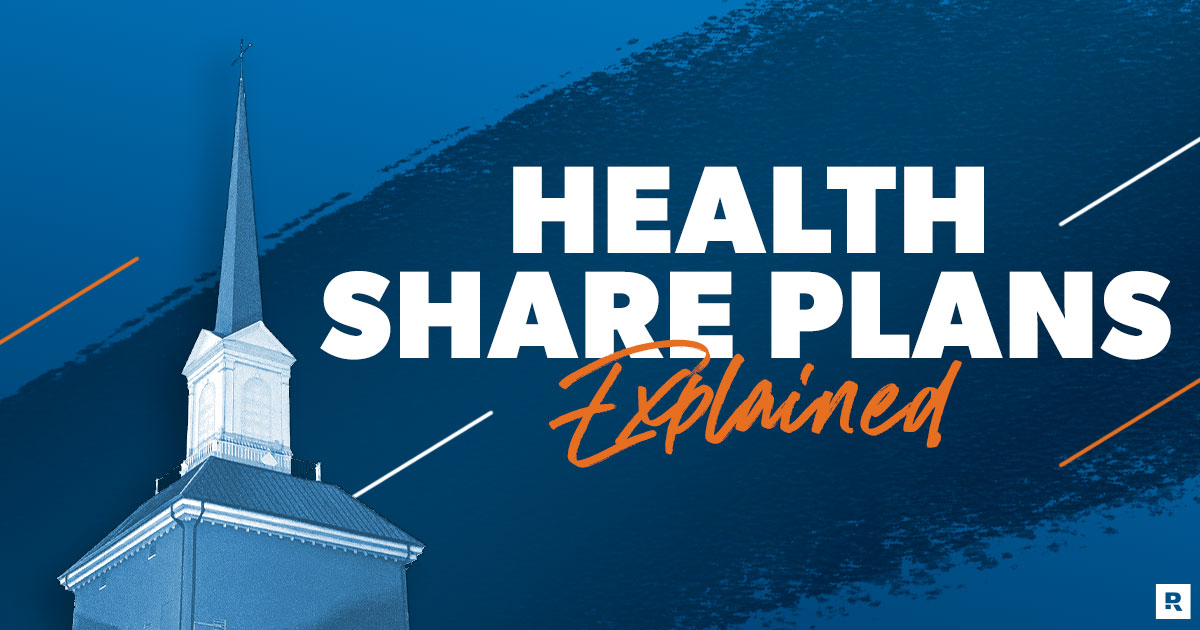
With inflation making everything more expensive, right now is a great time to save money on health care—or just about anything! If you’re trying to find ways to tighten up your health care budget, take a look at health share plans.
Health share plans are nonprofit ministries. That means members get to combine health care support with a way to serve others as an expression of faith. And these plans are getting more popular all the time. That’s not surprising when you realize how much money they can save you compared to traditional health insurance plans.
Let’s see what health share plans are all about.
What Is a Health Share Plan?
A health share plan is a type of health care support that lets you:
- Opt out of certain services you’d have to pay for (but would never use) if you bought the far more expensive traditional health insurance
- Save lots of money on membership costs because you’re only buying a basic list of services than what’s packaged in typical health insurance
What’s not to love?
Home and auto insurance aren’t just about low rates—they’re about the right coverage level. Talk to a trusted pro who can help you get both.
Plus, many people don’t like the idea of paying for medical services that conflict with their religious beliefs. So if that’s something you can relate to, imagine a health care plan that leaves those services out and charges way less for the package. That’s what health share plans give you!
Health share plans have been up and running for many years, but it’s only been since the Affordable Care Act (ACA) was passed in 2010 that they’ve really taken off. Back when the ACA became law, the cost of health insurance went way up—and the premiums just kept on rising.
Because of skyrocketing premiums, many people—including some employers and even insurance companies—found that health insurance was becoming unaffordable. In response to the growing need for truly affordable health care, existing health share plans grew and new ones were born. And today, millions of Americans use health share programs to take care of their health care needs.
Just to be clear: Health share plans aren’t technically a form of insurance. Basically, that just means employers can’t use a health share plan to comply with the government requirements to provide health insurance for employees. But because there are fewer requirements for these plans, they tend to be much more affordable.
Get insurance advice you can trust!
See how Dave Ramsey and his team of experts solve real money problems, like budgeting for insurance.
How Are Health Share Plans and Health Insurance Similar?
If you understand the basics of traditional health insurance plans, you’re already well on your way to understanding how health share plans work. The fact is, the two models have a lot in common.
Remember the monthly premiums you pay for your health insurance coverage? Health share plans have those too. And how about deductibles? Yep, health share plans usually set a minimum amount you have to pay annually before cost sharing kicks in.
Health share plans also have that handy list of recommended providers. And just like with health insurance, health share plans give you discounts when you get your services done in the network. On the other hand, going outside the network will mean paying more (or maybe all) of the bill for that service out of pocket.
Your membership cost will be determined by the level of participation you sign up for, based on your own budget. Again, this part is exactly like health insurance: If you’re willing to pay a higher monthly amount, your plan can include additional people in your family.
Here’s yet another similarity. As with health insurance, the contributions in your health share plan go into a pool of funds to pay for the ongoing needs of other members in the plan.
Basically, your money is kept in an account for you by the health share plan committee. Then, when someone in the plan has a medical need, they can submit a request for payment to take care of their medical services—anything from prescriptions to maternity expenses. Once the need has been approved by the committee, that member’s bills are paid by the health share plan using funds from other members’ accounts.
This is all sounding pretty similar—so what are the differences between health insurance and health share plans. Great question!
How Are Health Share Plans and Health Insurance Different?
What about the differences between health share plans and traditional health insurance? Well, there are a lot—and we’ve already touched on a few of them. Here are some other differences:
- Health share plans usually have restrictions on preexisting conditions. These restrictions aren’t allowed in health insurance plans that comply with the (ACA).
- You’ll often need to provide a statement of faith since most health share plans are faith-based organizations.
- Health share plans aren’t held to the same requirements as ACA insurance plans. That means the ministries are free to decide what kinds of services to offer their customers.
- While traditional health insurance aims to pay for all health care needs, health share plans are designed to cover the basics and catastrophic care for people who are pretty healthy. But some health share plans are more comprehensive. You’ll want to find out which programs fit your needs best as you compare companies.
- Some health share plans require new members to pay into the program for a year before newcomers have the option to share their health costs with the other members.
- Traditional insurance usually pays its portion of a claim and bills you for the rest, but health share plans reimburse you after you’ve paid up. That’s actually a good thing, because if you’re paying cash, you can often get a sweet discount on services.
- And finally, we’ll say it again (because we love it): Health share plans tend to be way more affordable than health insurance.
What Are the Pros and Cons of Health Share Plans?
Like with any product, health share plans have plenty of pros and cons. But weighing them up, we think the scale tips strongly in favor of using health share plans. Let’s walk through the good and the bad.
Pros
- Health share plans are typically much easier on your budget.
- You can get into a health share plan regardless of employment status, making it a great option for stay-at-home parents.
- There’s no need to wait for open enrollment—you can sign up any time.
- You won’t be kicked out of the program if you develop a medical condition.
- Most health share plans are explicitly Christian nonprofit ministries. One con with government-mandated health insurance is that in some states, exchange insurers are required to cover certain kinds of care that may violate some Christians’ faith. Health share plans solve that. Many Christians love knowing their money will never be used for procedures or services they don’t agree with.
- Many health share plans encourage their members to send letters and notes of encouragement to sick and recovering members, and you’ll have the comfort of knowing that believers nationwide are praying for you and your family as well.
- There are no annual or lifetime limits on medical expenses.
- Some (but not all) health share plans include discounts for dental and vision services.
- Disability sharing (a program to help those who are unable to work) is a feature in some health share plans.
- Some plans offer telehealth options.
- Sometimes, expenses for adoptions or funerals are included.
Cons
- What if coverage is denied? Most eligible medical bills are paid quickly. But no system is perfect. And if the organization fails to pay you—or goes bankrupt—there aren’t any regulations in place to make sure you get reimbursed.
- Health share plans definitely don’t count as minimum essential coverage. (That means they can’t be offered as an employee benefit by the ACA regulations that we mentioned before.)
- Preexisting conditions will either be ineligible or restricted in a health share plan.
- In some cases, a preexisting condition will require you to pay an additional fee beyond your normal membership cost to get support.
Even if there are cons, a health share plan might be the best option for you and your family. And if you look over those two lists, we think you’ll agree the pros easily outweigh the cons.
Which Health Share Plan Do We Recommend?
We’re so glad you asked! If you’re ready to combine great health care support with the opportunity to help others in a time of need, our trusted partner Christian Healthcare Ministries (CHM) can help you figure out your options.
Thousands of people in all 50 states use CHM to take care of their health care needs. Plus, they’re a RamseyTrusted partner, so you know they’ll share the medical bills they’re supposed to and honor their guidelines.
Ready to get excellent health care support? Connect with CHM today.
Interested in learning more about health insurance?
Sign up to receive helpful guidance and tools.



